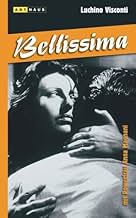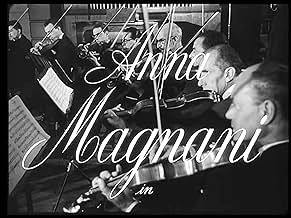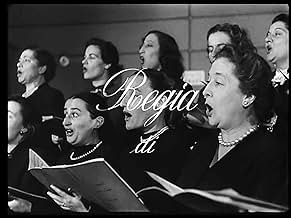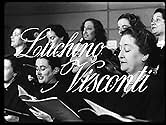Bellissima
- 1951
- Tous publics
- 1h 54min
NOTE IMDb
7,7/10
5,9 k
MA NOTE
Une femme de la classe populaire tente désespérément de faire entrer sa fille dans le monde du cinéma.Une femme de la classe populaire tente désespérément de faire entrer sa fille dans le monde du cinéma.Une femme de la classe populaire tente désespérément de faire entrer sa fille dans le monde du cinéma.
- Réalisation
- Scénario
- Casting principal
- Récompenses
- 1 victoire et 1 nomination au total
Liliana Mancini
- Iris
- (as Iris)
Vittorio Musy Glori
- Self
- (as Vittorio Glori)
Avis à la une
This is a very small story--a poor woman tries to make her daughter a child movie star--but it has a tremendous, operatic performance from Anna Magnani. Magnani is like all other stage mothers in that the success she desires for the child is really her frustrated ambition for herself (her tiny daughter has no interest in acting, and whines and cries all through the picture), but unlike them in that she never loses her sense of humour. When she realises she has been cheated, instead of becoming outraged, she laughs at her own foolishness, briefly relaxing from her usual blind intensity to become a normal, likable woman.
Her character's desperation to escape her life is understandable when one sees the dump she lives in with her husband and child. The small, dilapidated flat with stained walls, in a building full of fat, sour- faced harpies in hideous housedresses--one never sees such horrors in Hollywood films. Too bad this neo-realism became old-style realism--we could use some of this today as a counter to the candy-floss world we see on TV and in the movies.
One amusing note: The film-struck Magnani says at one point to her husband, "Oh, Burt LanCASter! Molto gentile!" Three years later Lancaster would be playing her lover in The Rose Tattoo.
Her character's desperation to escape her life is understandable when one sees the dump she lives in with her husband and child. The small, dilapidated flat with stained walls, in a building full of fat, sour- faced harpies in hideous housedresses--one never sees such horrors in Hollywood films. Too bad this neo-realism became old-style realism--we could use some of this today as a counter to the candy-floss world we see on TV and in the movies.
One amusing note: The film-struck Magnani says at one point to her husband, "Oh, Burt LanCASter! Molto gentile!" Three years later Lancaster would be playing her lover in The Rose Tattoo.
In a post-war Italy, Maddalena Cecconi (Anna Magnani) is a woman from the lower classes abused by her husband Spartaco Cecconi (Gastone Renzelli), who is obsessed to make her young daughter Maria (Tina Apicella) a star in the cinema industry. She expects a better life for Maria, and she sacrifices her marriage and her savings paying interpretation and ballet teachers, dress, hairdresser and bribe for the small time crook Alberto Annovazzi (Walter Chiari) to make her dream come true. When the director sees the test of Maria, Maddalena realizes the reality and cruelty of the entertainment industry.
"Belissima" is a beautiful tale of disillusion. Anna Magnani has a magnificent interpretation in a role of a very poor mother and frustrated woman, spanked by her husband, trying to give a better life for her young daughter. Living nearby a movie theater, she sees the opportunity when a famous director is chasing a young talent for his next movie. Her characters gives the best effort within her short culture and vision trying to make her dream comes true, being very touching the moment when her dreams are shattered. The direction of Luchino Visconti is precise and flawless as usual, and the story is very real and credible. My vote is eight.
Title (Brazil): "Belíssima" ("Very Beautiful")
"Belissima" is a beautiful tale of disillusion. Anna Magnani has a magnificent interpretation in a role of a very poor mother and frustrated woman, spanked by her husband, trying to give a better life for her young daughter. Living nearby a movie theater, she sees the opportunity when a famous director is chasing a young talent for his next movie. Her characters gives the best effort within her short culture and vision trying to make her dream comes true, being very touching the moment when her dreams are shattered. The direction of Luchino Visconti is precise and flawless as usual, and the story is very real and credible. My vote is eight.
Title (Brazil): "Belíssima" ("Very Beautiful")
In "Bellissima" (1951) an overambitious mother drags her 6 year old daughter to a talent show. The theme of "Bellissima" has something in common with "Little miss sunshine" (2006, Dayton & Faris). In both cases the daughter has no chance against the barby dolls that are her opponents. In "Little miss sunshine" the initiative is however by the daughter herself (although her parents ought to do more to protect her). In "Bellissima" the initiative lays cleary by the overambitious mother.
"Bellissima" was the end of the neo realist period in the carrier of Luchino Visconti, after films such as "Ossessione" (1943) and "La terra trema" (1948). The film is situated in a workers environment but live in this environment is no longer as bad as it was in the heydays of neorealism. In fact live in the showbusiness of Cinecitta is much more ruthless.
The lead actress Anna Magnani is still a true representative of the neo realist age. Think about her role in "Roma, citta aperta" (1945, Roberto Rossellini). In "Bellissima" she is brilliant as the mother who is cheated by the Cinecitta employees but who is also cheating herself against other mothers and their "bellissima's".
The film tells a rather simple story but makes maximum use of facial expressions and close ups, especially those of Magnani herself and Tina Apicella (playing her daughter Maria). Especially towards the end of the film the close ups are tellng us more than a thousend words.
"Bellissima" was the end of the neo realist period in the carrier of Luchino Visconti, after films such as "Ossessione" (1943) and "La terra trema" (1948). The film is situated in a workers environment but live in this environment is no longer as bad as it was in the heydays of neorealism. In fact live in the showbusiness of Cinecitta is much more ruthless.
The lead actress Anna Magnani is still a true representative of the neo realist age. Think about her role in "Roma, citta aperta" (1945, Roberto Rossellini). In "Bellissima" she is brilliant as the mother who is cheated by the Cinecitta employees but who is also cheating herself against other mothers and their "bellissima's".
The film tells a rather simple story but makes maximum use of facial expressions and close ups, especially those of Magnani herself and Tina Apicella (playing her daughter Maria). Especially towards the end of the film the close ups are tellng us more than a thousend words.
'They do not make movies like those anymore' is a saying that makes me smile. Of course, it is true. For the good and for the bad. The technical means, the tastes of the audiences, the style of acting, and many more have changed over the 120 years of cinema history. The reciprocal saying is also true: "Then, they were not making movies like we have today". Also for the good and for the bad. Watching movies like 'Bellissima' makes me think that there also are a few important things that stayed the same. Many viewers, when watching a movie, look for emotions and sincerity, want to see a well-told story, with characters that they understand and identify with. For these viewers, good movies had, have, and will have these qualities. It's the case of Luchino Visconti's 'Bellissima', a 1951 film that succeeds to make us interested and emotional today, because of its cinematic and sentimental qualities, and through the magical acting of the actress around which the film is built: Anna Magnani.
There is a recurrent discussion in Hollywood about the need for strong female roles. Seeing this film and remembering a few other Italian films from the 50s or 60s ('The Nights of Cabiria', 'La Ciociara'), I believe that this discussion must have been entertained many times in history. It is true that Italian cinema has benefited from exceptional actresses such as Giulietta Masina, Sophia Loren, or Anna Magnani. In 'Bellissima' two very popular themes and styles meet: the movies about movies industry, a constant in the cinema history, and the Neo-realism of the Italian cinematography between 1945 and 1960. Maddalena Cecconi, the main heroine of the film, lives in a poor neighborhood of Rome together with her husband and their six-year-old daughter. Both spouses work from dawn to night, but hardly manage to cover the cost of living. Cinema is part of their life, outdoor projections in the inner courtyard of the multi-storey apartments building where they live on rent is both entertainment and existential surrogate, transporting viewers into the imaginary worlds on the big screen. When a competition is announced at the Cinecittà studios for a child role that will be attributed to the most beautiful girl in Rome, Maddalena immediately sees the opportunity to change the life of her little girl, break the economic and social barriers, move her into the dream world. She will be ready to do everything or almost everything to get the little girl succeed, but here she will face another layer of social reality. The world of cinema is far from the ideal that viewers see on screen. It is a world in many ways more ruthless and more unequal than the one of the proletarian neighborhoods. The political convictions of Visconti, one of the most radical Neo-realists, are expressed in this film without hesitations or ambiguities.
The film has many qualities that make it pass the exam of time. The script is very well written, the characters are well drafted forming a true social mosaic, the story does not linger at any moment, and humor is also present, probably in a higher dose than in any other Visconti movie. But above all we have Anna Magnani's fascinating acting performance. She is passionate and obsessed with protecting her daughter, sensual and dignified, she burns on the screen. To emphasize her acting, Luchino Visconti uses an original cinematic technique, and I wonder if a director today would have the courage to adopt it in a contemporary movie: he fixes the camera on the heroine figure, even in motion scenes or in dialogues . Sometimes he seems to have forgotten to change plans, but of course, everything is intentional. Beautiful, expressive, modern! 'Bellissima' is a movie that manages to create emotion, but also an acute social critique directed against the exploitation of children in the film world. And if that was the case, the little girl who played in the film as Anna Magnani's daughter started and ended her acting career with this movie, never to return to act in another role!
There is a recurrent discussion in Hollywood about the need for strong female roles. Seeing this film and remembering a few other Italian films from the 50s or 60s ('The Nights of Cabiria', 'La Ciociara'), I believe that this discussion must have been entertained many times in history. It is true that Italian cinema has benefited from exceptional actresses such as Giulietta Masina, Sophia Loren, or Anna Magnani. In 'Bellissima' two very popular themes and styles meet: the movies about movies industry, a constant in the cinema history, and the Neo-realism of the Italian cinematography between 1945 and 1960. Maddalena Cecconi, the main heroine of the film, lives in a poor neighborhood of Rome together with her husband and their six-year-old daughter. Both spouses work from dawn to night, but hardly manage to cover the cost of living. Cinema is part of their life, outdoor projections in the inner courtyard of the multi-storey apartments building where they live on rent is both entertainment and existential surrogate, transporting viewers into the imaginary worlds on the big screen. When a competition is announced at the Cinecittà studios for a child role that will be attributed to the most beautiful girl in Rome, Maddalena immediately sees the opportunity to change the life of her little girl, break the economic and social barriers, move her into the dream world. She will be ready to do everything or almost everything to get the little girl succeed, but here she will face another layer of social reality. The world of cinema is far from the ideal that viewers see on screen. It is a world in many ways more ruthless and more unequal than the one of the proletarian neighborhoods. The political convictions of Visconti, one of the most radical Neo-realists, are expressed in this film without hesitations or ambiguities.
The film has many qualities that make it pass the exam of time. The script is very well written, the characters are well drafted forming a true social mosaic, the story does not linger at any moment, and humor is also present, probably in a higher dose than in any other Visconti movie. But above all we have Anna Magnani's fascinating acting performance. She is passionate and obsessed with protecting her daughter, sensual and dignified, she burns on the screen. To emphasize her acting, Luchino Visconti uses an original cinematic technique, and I wonder if a director today would have the courage to adopt it in a contemporary movie: he fixes the camera on the heroine figure, even in motion scenes or in dialogues . Sometimes he seems to have forgotten to change plans, but of course, everything is intentional. Beautiful, expressive, modern! 'Bellissima' is a movie that manages to create emotion, but also an acute social critique directed against the exploitation of children in the film world. And if that was the case, the little girl who played in the film as Anna Magnani's daughter started and ended her acting career with this movie, never to return to act in another role!
After Rome's Cinecitta Studios announces a call to cast a young girl in a movie, Maddalena Cecconi (Anna Magnani) joins a horde of other parents (mostly mothers) as she drags her daughter Maria (Tina Apicella) to the audition. Although Maria is plain, talentless, and clearly uninterested, Maddalena still pushes through in the hopes Maria raises the family to a higher station in life.
In the film's opening scene during the mass audition, director Luchino Visconti smartly uses an overhead shot of the families crowding into the studio door, much like cattle being crowded into a slaughterhouse. Like the Hollywood classic "Sunset Boulevard" released only a year earlier, "Bellissima" is a creation by the film industry about how horribly the film industry treats people. Although the story occurs at a certain place and time, its message is universal and timeless: beware of the belief that "stardom" will make life better; the relentless pursuit of it could actually make life worse.
The film begins well and its middle section is enjoyable though unexceptional. But they both build up to a final half-hour that is mesmerizing. Its denouement begins with a very clever scene involving a film editor who used to be a renowned actress. From that point and incidents that follow, Maddalena has revelations that are heart-rending and her actions are shocking.
And is it possible to praise La Grande Magnani any more than she has already been praised? I'll try. It has been said that truly great actors have the ability to captivate audiences even when reading aloud the contents of a telephone directory. Magnani could go even further than this. She could captivate an audience even while silently listening to another read to her the contents of said directory. Her face registers so much. Her performance in this film is rightly praised as one of her best. That says a lot. - dbamateurcritic
OUTSTANDING ACHIEVEMENT: Acting by Anna Magnani.
In the film's opening scene during the mass audition, director Luchino Visconti smartly uses an overhead shot of the families crowding into the studio door, much like cattle being crowded into a slaughterhouse. Like the Hollywood classic "Sunset Boulevard" released only a year earlier, "Bellissima" is a creation by the film industry about how horribly the film industry treats people. Although the story occurs at a certain place and time, its message is universal and timeless: beware of the belief that "stardom" will make life better; the relentless pursuit of it could actually make life worse.
The film begins well and its middle section is enjoyable though unexceptional. But they both build up to a final half-hour that is mesmerizing. Its denouement begins with a very clever scene involving a film editor who used to be a renowned actress. From that point and incidents that follow, Maddalena has revelations that are heart-rending and her actions are shocking.
And is it possible to praise La Grande Magnani any more than she has already been praised? I'll try. It has been said that truly great actors have the ability to captivate audiences even when reading aloud the contents of a telephone directory. Magnani could go even further than this. She could captivate an audience even while silently listening to another read to her the contents of said directory. Her face registers so much. Her performance in this film is rightly praised as one of her best. That says a lot. - dbamateurcritic
OUTSTANDING ACHIEVEMENT: Acting by Anna Magnani.
Le saviez-vous
- AnecdotesIn the final scene, Anna Magnani hears the film playing outside her room and remarks that she hears Burt Lancaster. Magnani would win an Oscar four years later for The Rose Tattoo, in which she would costar with Lancaster.
- ConnexionsEdited into Al Centro del cinema (2015)
Meilleurs choix
Connectez-vous pour évaluer et suivre la liste de favoris afin de recevoir des recommandations personnalisées
- How long is Bellissima?Alimenté par Alexa
Détails
- Date de sortie
- Pays d’origine
- Langue
- Aussi connu sous le nom de
- Beautiful
- Lieux de tournage
- Ristorante Al Biondo Tevere, Via Ostiense, 178, Roma RM, Italie(Trattoria by the River Tiber)
- Société de production
- Voir plus de crédits d'entreprise sur IMDbPro
- Durée
- 1h 54min(114 min)
- Couleur
- Rapport de forme
- 1.37 : 1
Contribuer à cette page
Suggérer une modification ou ajouter du contenu manquant




























